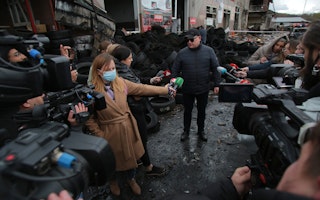What’s in Your Drinking Water? Too Many People Still Don’t Know
By Elizabeth Moses

Many of us who work to make governments more transparent and accountable happily celebrated this year’s International Right to Know Day. First established by freedom of information activists back in 2002 and formally recognized by UNESCO in 2015, this year’s celebration was filled with events all over the world promoting access to information and the need for open, democratic societies with full citizen empowerment and participation in government.
But 15 years after the first celebration, we still have a long way to go—especially in making data accessible to our citizens who are fighting for a healthy environment and access to safe drinking water. A new report by World Resources Institute, Thirsting for Justice: Transparency and Poor People’s Struggle for Clean Water in Indonesia, Mongolia and Thailand, analyzes what’s gone wrong—and what can be done to fix it—in countries struggling to balance sustainable economic development with citizens’ right to know if their water is safe to use or dangerously toxic.
Indonesia, Mongolia, and Thailand, along with 113 other countries, have passed strong “right to know” laws, which grant citizens the right to ask for information that government agencies collect. Many of these countries also require officials to disclose information in public reports and data portals.
But as documented in Thirsting for Justice, in the real world, where local communities are concerned about the sources and impacts of pollution, government transparency is missing. Shrimp farmers in Indonesia are catching less shrimp. Mongolian herders’ livestock are getting sick and dying. A small Thai village is suffering from high levels of cancer and birth defects.
In each case, private companies (including pulp and paper mills in Indonesia, gold mining companies in Mongolia, and petrochemical plants in Thailand) are polluting the water. But the governments are not sharing information that people need to know whether water they use for drinking, bathing, farming, or fishing is polluted—or dangerously toxic.
They are not alone. Many people living in rural, marginalized communities are unaware of their right to information. Even when they do understand these rights, they can face steep obstacles to getting the facts and holding their governments accountable for poorly enforcing environmental laws.
Families living in remote areas have few computers and limited internet access, making it nearly impossible for them to navigate national websites or access online databases. And community members who submit information requests often receive documents in languages they don’t speak or highly technical data that they can’t comprehend.
Although poorly implemented right-to-know laws contributed to the problem of poor transparency, the health and environmental information that is needed is not always available. People need access to specific documents, such as health and environmental impact assessments, water monitoring analyses, and enforcement reports to identify polluters and determine if their water is too contaminated to use.
Too often, however, governments release summary reports that don’t provide that actionable information that local communities need.
A radical shift in information sharing is necessary to protect people from using contaminated water. Civil society, private funders, and bilateral donors working to support open government can help ministries redesign information disclosure systems so that they are accessible to countries’ poorest, most vulnerable citizens.
Some solutions include providing information in radio broadcasts and in highly visual, easy-to-read brochures to those without internet access. Officials can also survey communities about their information needs and make sure that government agencies release this data in local areas.
Evaluating success with a bottom-up lens is important beyond the fight for environmental justice. The open government community has succeeded in creating universal acceptance of the idea that transparency is not just a human right, but also the foundation for inclusive and accountable government.
As we reflect on this year’s International Right to Know Day, we must ask ourselves this question: if national laws and disclosure frameworks do not provide people with the information they want and need, has progress lived up to the principle?
World Resources Institute is a grantee of the Open Society Foundations.
Elizabeth Moses is a research analyst in the Environmental Democracy Practice at the World Resources Institute.


